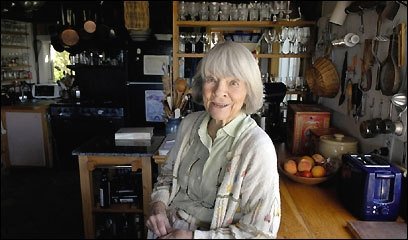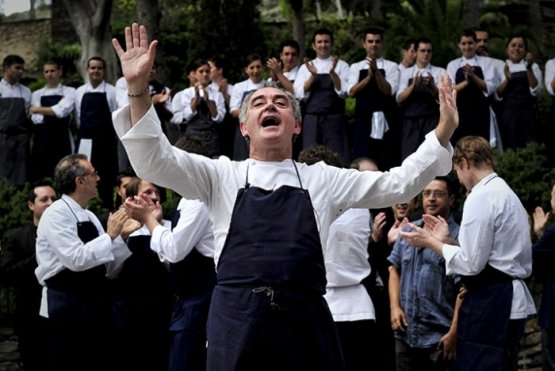A few days ago The Wall Street Journal published a nice portray of editor Judith Jones - unknown to most but legendary for those in the industry - of some great classics in American food literature: the most famous perhaps being “Mastering the art of French cooking” by Julia Child, but Jones also curated - in some cases in the way you would do with art, in others as with a difficult patient - the texts of many experts in the field.
Today, at 90, she answers questions with a mix of pragmatism, impatience and humour: she disapproves when guests bring something other than wine for dinner, because «you spend a lot of time planning a balanced menu and then someone brings cupcakes». Explaining how you learn to cook at home, she uses ballet as a metaphor: «You cannot face pirouettes before having perfected the fundamental sequences, barre exercises. The same can be said for any hobby or profession, of course, but one needs to make clear, each time, what you mean by "barre exercises”.
I've been analysing the role of the food critic of the future for some time. I don't review restaurants but I am fascinated by those who know how to do it (well). I've always had a soft spot for Ruth Reichl. I interviewed her in 2005, when she was directing Gourmet: "Garlic and sapphires" was just out, a memoir in which she wrote about the years as a food critic for the New York Times, including the extravagant disguises using which she tried to remain anonymous. I like Frank Bruni (it's his fault - merit? - if I went in search of one of the “best steaks in town” at the Penthouse Club restaurant) and Sam Sifton, who succeeded Reichl in the newspaper, Adam Platt at the New York Magazine and Robert Sietsema, historic author of the Village Voice.

THE FUNDAMENTALS. Judith Jones, legendary American editor : «You cannot face a pirouette before perfecting basic sequences» (photo Caleb Kenna The Globe)
I turn pale when they tell me about
Luigi Cremona, who is capable of reading a dish with such profoundness and sensitivity that he manages to correct the recipe, to the advantage of the chef.
Enzo Vizzari is a national institution. Some colleagues in my generation write about restaurants with great competence and passion: if I don't make names, it is just because they are friends. To put it in the words of
Judith Jones: what are the “barre exercises” for a young person who decides to become a food critic in 2014?
Perhaps, even before speaking about training, one should discuss if the profession of the critic is sustainable, if there will still be the need for people who are capable of giving a technical, as well as emotional, judgement on a restaurant. In my opinion, yes. Today people write a lot (too much: we have acquired immediacy and access thanks to new platforms, but we're losing in terms of selection) about restaurants, but an acritical approach prevails, or there's preconceived enthusiasm. Not everybody can be good. A reader basing his decision on how to spend his time and money on an article deserves more. And the chef also deserves more, since he sacrifices everything to cook, in a constant process based on research, mistakes and improvements. Who will take the responsibility to write for them, about them, in the future? With what tools?

LIGHTHOUSE. Ruth Reichl, New Yorker critic and writer, born in 1948
used to say that you don't need to know how to cook well to be a good critic; but this doesn't mean one is exonerated from knowing professional techniques in the kitchen. The critic of the future will need to study (specialised courses, if one wants, do exist), read voraciously, from treatises on medical stocks from the 18th century to French recipe books, to food cost spreadsheets to fermentation equations; speak with chefs as much as possible, spend time in their kitchens; attend congresses. Food critics will need to nourish a beautiful and "socially useful" style: avoiding jargon when it only has a self-praising result, taking care of style (one can be technical and musical, detailed and literate), transferring an information that can be at the service of the reader, not the author.
Then there's the palate, which is three-fifths innate and two pliable with constant exercise. The experience, from inns to starred restaurants, is crucial: our aspiring critics should never stop eating, daring even outside their comfort zone, and their country. They need to taste everything, taste again, and then again, with passion and concentration. And here, the greatest obstacle will appear for them. Because some revolutionary establishments, some milestones on which the best contemporary gastronomy is based, no longer exist and can be visited. Every generation has to come to terms with the loss of some point of reference, of course, but in this case, we're speaking of innovators, in the context of two sectors - modern fine dining and food criticism - that are relatively young.

THE END OF THE FILM. 31st July 2011: Ferran Adrià closes El Bulli for good. What about those who have never been there? (photo Josep Lago/AFP/Getty Images)
How can those who, like me, have never tried
El Bulli, include that fundamental lesson in their take of a dish, today? This is one example but one could make more. And the problem is that this crushing of historic perspective prevents a truly "vertical" criticism, capable of creating links across time, besides those in current space. Cuisine does not exist in a pneumatic void and each dish includes the genes of many dishes from the past. One needs to know them to recognise them.
An aspiring film critic will always be able to watch Kubrick, Cocteau, Kurosawa and Rossellini once more. Arthur Rubinstein and Arturo Benedetti Michelangeli survive in the registrations of memorable performances. Once closed, a restaurant is - for those who have not visited it - an experience lost for good. A remise en scène such as “Next vs. El Bulli”, a temporary “capsule” of Adrià's restaurant created by Grant Achatz in 2012, is brilliant but ephemeral and in any case it is untied from the original context (a dish equals food+setting+moment).
I sometimes daydream about a great encyclopaedia of essential dishes from modern gastronomy, hundreds of dishes, with illustrations and photos, and detailed descriptions. Nothing can give back the power of an experience in first person, especially when one speaks of flavour, pleasure and beauty, but one should at least be able to study, if not to try. I don't think such a work exist (I have found some lists, some more interesting than others, but not a universal index): perhaps we should begin to produce it.